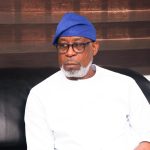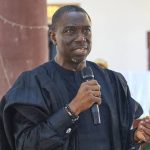2019 election and under-age voting
KEN UGBECHIE
 You must give Nigeria’s political actors some credit for their amazing skills. They, alone, have the ability to be black at dawn and white at dusk. They have the capacity to pull the wool over everybody’s eyes. They make the electorate look away from the real issues. Like your local politician providing a TV viewing centre in your community and all the youths will assemble there to watch English Premier League, Spanish La Liga, fight over UEFA Champions League results, debate who is the best actor/actress in Nollywood, engage in endless inanities while the same politician continues with his looting and plundering of the youths’ tomorrow.
You must give Nigeria’s political actors some credit for their amazing skills. They, alone, have the ability to be black at dawn and white at dusk. They have the capacity to pull the wool over everybody’s eyes. They make the electorate look away from the real issues. Like your local politician providing a TV viewing centre in your community and all the youths will assemble there to watch English Premier League, Spanish La Liga, fight over UEFA Champions League results, debate who is the best actor/actress in Nollywood, engage in endless inanities while the same politician continues with his looting and plundering of the youths’ tomorrow.
As the youths dispense their energies and lazy away at the viewing centre, the politician, their benevolent benefactor, is buying up property in the United Kingdom, United States, Dubai, United Arab Emirates, Abuja, Lagos and sending his children to study in the best offshore universities all from the public purse. It is this ability to divert public attention from real and germane issues that makes the Nigerian political class a special breed.
And just this moment, everybody, including the ever energetic youths, is busy talking about Buhari seeking re-election, or how a certain Atiku Abubakar would unseat Buhari, or the likelihood that Obasanjo, Danjuma and Babangida coalition of jaded and retired Generals would be the perfect counterfoil to the Buhari blizzard. Everybody is talking about the presidential candidates and their success probabilities. Nobody is discussing the real issue which is the entire electoral process that would ultimately produce the next president, governors and lawmakers.
At this time, the credibility of the electoral process ought to engage Nigerians. Nigeria’s electoral body has had the historical misfortune of conducting elections which usually end up contentious. Certain elements coalesce to taint elections in Nigeria chief of which is the lack of integrity of the voter register. The voter register provides the foundation for an election to be either free and fair or downright dubious. Already, there are disturbing indicators that the voter register for the 2019 election is dubious. The reported cases of under-age registration and under-age voting that characterised local government elections in Kaduna and other parts of Northern Nigeria is worrisome. It is a carry-over from the inconsistencies and distortions that dogged previous elections. We can contend that local government elections are conducted by state electoral bodies; yet we know that the same story of under-age voting runs through the entire mill.
When infants are allowed to register and vote, that election is both doomed and toxic. It is this matter of under-age voting that should engage Nigerians at this moment. It has crept insidiously into all elections from local government to presidential elections. And it is prevalent in the North. Strangely, Nigerians are silent about it.
The Independent National Electoral Commission (INEC) appears helpless. It seemed incapable of genuine and reasonable intervention. In other words, there will be no end to under-age voting. When INEC Director of Publicity and Voter Education, Mr. Oluwole Osaze-Uzzi, made an appearance on a TV programme recently, he offered a lame albeit flawed alibi on why under-age registration and voting persist in the North. He said INEC officials were usually under pressure from certain persons to register under-age voters. In most cases, the locals threaten INEC officials and to save their lives they have to oblige them by registering and allowing infants to vote.
He painted a scary picture of how parents came to registration points with their children claiming that their children were over 18. In instances, where the INEC official refused to register them on account of their being less than 18 years, such officials were usually threatened and forced to register the underage children.
He said: “I agree that it is the responsibility of the registration officer to do that (refuse to register underage persons), but there are times that circumstances are such that where there is present and clear danger that he risks being assaulted or being killed, I think it will be unreasonable to expect him not to succumb to the pressure. But we encourage them to report immediately they get out of that dangerous zone.
“Even to the untrained eye, that child doesn’t look more than 15, but in such circumstances, you cannot argue too much with them. The law says the registration officer is entitled to act on some kind of identification or birth certificate or proof of age.
“But very often, they are resisted, especially when there are lots of people there. They are challenged in a charged atmosphere and they are there without any protection. Many of them are there in strange communities which they don’t know anything about. So, there is undue pressure on them to register at this point.”
This is the position of INEC on under-age voting. It is untenable. It is a veiled endorsement of illegality. By putting such timid excuse, INEC is ipso facto asking other parts of the country to embark on under-age registration spree by threatening INEC officials and repeating same on voting day with a threat. It doesn’t make sense. INEC should rethink its strategy against under-age registration and voting.
INEC’s explanation that the names of the under-age voters were usually removed by senior INEC officials with assistance from the natives before the voter register were displayed flies in the face of logic. What you were not able to resist at the point of registration cannot be removed after registration. This is troubling, far more dangerous than the quality of candidates vying for election.
Under-age voting rubbishes any election and puts a slur on the outcome of the election. If INEC truly wants to conduct free, fair and credible election next year, it must detoxify the voter register and rid it of under-age voters. Going forward, INEC must involve security personnel during the voter registration exercise. On no account should INEC officials embark on voter registration without adequate security cover.
The very fact that under-age voting is more prevalent in a particular part of the country gives that part undue advantage over others. Besides, it makes a mess of our electoral system. During the 2011 and 2015 elections, underage voting was the norm in the North with international media, including the CNN, beaming images of infants on the queue who were duly accredited and allowed to vote against the tenets of the law and the provision of adult suffrage of 18 years and above. Surprisingly, INEC turned a blind eye to the matter which at the very least tainted the Nigerian election.
It’s dangerous to pretend not to notice the damage under-age voting and other electoral incongruities do to the nation’s election and to her image. Smaller African nations, namely Sierra Leone and Liberia, have taught Nigeria a lesson on electoral purity. Both countries’ recent presidential elections went to run-off. At the end, opposition candidates won. The international observers scored both elections high on integrity and credibility. Our own INEC must rise to the occasion.
But the youths, especially the social media warriors, should start a strong campaign against under-age voting. It is one of the reasons that wrong candidates are elected to ruin their tomorrow.








